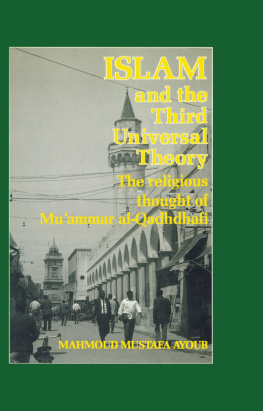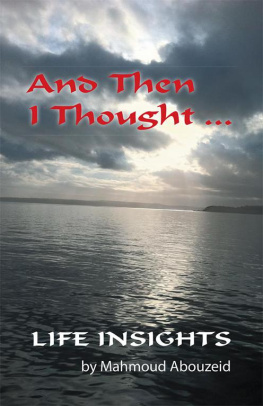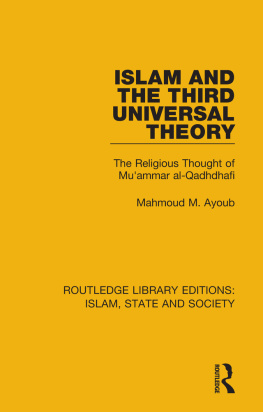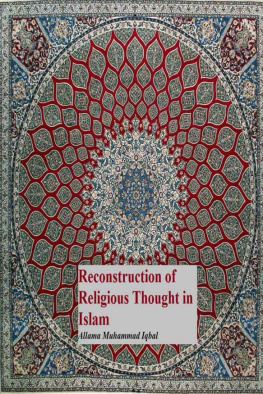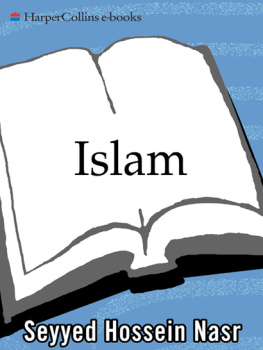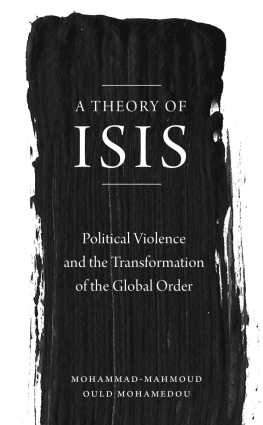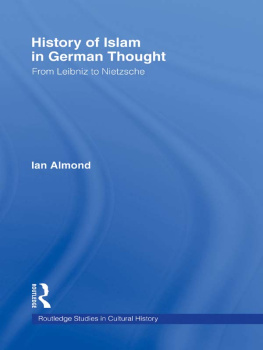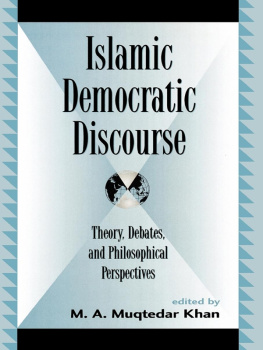Islam and the Third Universal Theory: The Religious Thought of Muammar al-Qadhdhafi
First published in 1987 by KPI Limited
This edition published 2015 by Routledge
2 Park Square, Milton Park, Abingdon, Oxon OX14 4RN
711 Third Avenue, New York, NY 10017
Routledge is an imprint of the Taylor & Francis Group, an informa business
Produced by Worts-Power Associates
Set in Times
by Paragon Photoset, Aylesbury
Mahmoud Mustafa Ayoub
No part of this book may be reproduced in any form without permission from the publisher, except for the quotation of brief passages in criticism.
ISBN 13: 978-0-7103-0260-1 (hbk)
One of the most controversial figures of modern times has been Colonel Muammar al-Qadhdhafi, leader of the Libyan popular revolution of 1 September 1969 and author of the Third Universal Theory. For the West, and especially the Western media, Qadhdhafi is the villain of the piece, master terrorist and close ally of communist Russia. For conservative Arab rulers, Qadhdhafi is the madman of Libya, and an atheist communist. For millions of the oppressed of Asia, Africa and Latin America, Qadhdhafi is a hero, a comrade in the revolutionary struggle against imperialism, exploitation and racism. In short, al-Qadhdhafi has been loved and hated, admired and ridiculed, and above all feared as an impulsive politician who refuses to play the usual games of international diplomacy.
The personality and intellectual makeup of Muammar al-Qadhdhafi were formed in the desert, where austerity and simplicity of life provide the basic framework within which he was born and nurtured. Thus his insistence on a simple and straightforward approach to Islam as a religious faith and system of values is an integral part of his desert character. It is, moreover, this uncompromising character which has earned him the condemnation of many traditional Muslim religious leaders and movements, and provided his opponents among Arab rulers with a powerful weapon to use against him in their propaganda, in both the East and West. It is the religious dimension of Qadhdhafis thought which has been least studied, but which deserves close attention because it provides the foundation and framework of his ideology and public life in all its aspects.
The aim of this work is to present an objective and comprehensive study of Muammar al-Qadhdhafis religious thinking and its place in his political, economic and social philosophy. My task is not to judge Qadhdhafi as a leader, his sincerity as a man of faith, or to determine the degree of success in implementing his philosophy at home or abroad. It is rather to present to Muslim and non-Muslim readers a true picture of his religious thought and convictions as a Muslim. This I shall attempt in the hope that unfounded speculations about Qadhdhafis thought and personality will, at least, be questioned as a major source of information. I can do no better in fulfilling this purpose than to let Qadhdhafi speak for himself.
I have relied in my research for this study on a variety of primary and secondary sources. The most important source is, of course, Qadhdhafis own words. These have been preserved in annual volumes collectively entitled al-Sijill al-Qawmi (The National Record). These important volumes provide, in chronological order from the start of the revolution, 1 September 1969, to the present, all the speeches, media interviews, press conferences and public addresses which Qadhdhafi has delivered on both religious and national occasions. His religious addresses and discourses have also been collected in a volume entitled Khutab wa-Ahadith al-Qaid al-Diniyah , which constitutes an important primary source for this discussion. The Green Book and commentaries on it written by Qadhdhafi himself and others provide the primary source for our understanding of the type of society which he envisages for his country and the rest of humankind.
The works of Libyan thinkers produced by the International Institute for Studies and Research on The Green Book , in books, pamphlets and monographs, are especially significant because they reflect the views, analyses and judgements of the people most directly concerned with the Third Universal Theory and its application in real life. Muammar al-Qadhdhafi is a devoted Arab nationalist. His words and ideas are addressed first and foremost to the Arab people of his country and the rest of the Arab world. Thus, Arab writers who have dealt with his ideological and political thought must be given serious attention as important, albeit secondary, sources. The works of Western writers - journalists, political scientists and historians - are used only as sources for our understanding of Western attitudes towards Colonel Qadhdhafi and his thought.
The biographical portrait of Qadhdhafi, so sensitively and sympathetically presented by Mirella Bianco, will be used as an important primary source in discussing Qadhdhafis formative years before the revolution. The book appeared first in French under the title Kadhafi, Messager du Desert , and was subsequently translated into English under the title Gadafi, Voice from the Desert. It is generally regarded as the chief biography of Qadhdhafi, even by the Libyan authorities, who had the book translated into Arabic. The author based her work on first-hand information gathered through extensive travel in Libya and elsewhere, interviewing a large number of people who knew or worked with Qadhdhafi, including his parents and other members of his family and tribe.
While the present study will deal mainly with Muammar al-Qadhdhafis religious thought, it will none the less attempt to do so in the context of his general philosophy known as the Third Universal Theory, and contained chiefly in The Green Book. It is important, therefore, to present first the man and his intellectual development from his childhood to the start of the revolution, when the major aspects of this theory and its application reached their fruition. This will be the concern of the first chapter of this book. In this chapter, we shall look at Qadhdhafi through the eyes of those who have admired him and have remained his loyal supporters. These somewhat laudative impressions are in fact our only source of information about Qadhdhafi before the revolution. In the second part of this chapter we shall follow the first steps of the revolution from its inception to its execution.
The second chapter will discuss Qadhdhafis vision of the new society of the masses as presented in The Green Book. This chapter will consist of three parts, dealing with the political, economic and social structures respectively.
The third chapter will deal with Qadhdhafis faith as a Muslim thinker. It will be divided into four parts. The first will deal with Qadhdhafis view of Islam as a universal religion, and its relationship with other faiths, notably Judaism and Christianity. The second will present his view of the Quran and Prophetic Tradition as sources of the law of society. The third part will examine the relation of Islam to politics in contemporary society. Qadhdhafis vision of a just society is based on his theory of the new Islamic socialism, which will be discussed in the final section of this chapter.
In The Green Book Qadhdhafi argues that religion and nationalism are the two primary forces moving human history. The fourth chapter of this study will deal with this assertion. It will examine the role of religion and nationalism in the process of human history, the role and mission of the Arab nation, and the predicament of national minorities in the larger national and religious societies of the modern world.

